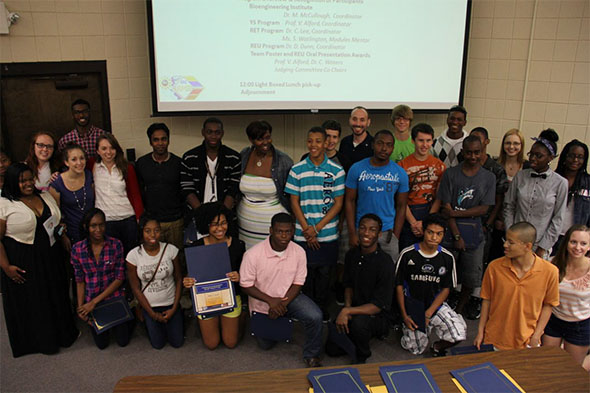Cultivating Student’s STEM Roots NSF ERC for Revolutionizing Metallic Biomaterials
Outcome/accomplishment: The K-12 Education and Outreach Team at NCAT organized several informal as well as structured outreach events over the reporting period. These included a day-long Girl Scout Workshop, an Introduce-A-Girl-to-Engineering event during Engineers Week 2012 at a Science Magnet School, organization of a 2-day ‘Science Extravaganza’ event at a local elementary school, a Society of Women Engineers outreach at the Greensboro Childrens’ Museum and the hosting of visits from/to several local schools by RMB students and staff. A highlight of ERC-RMB’s educational efforts is the continued collaboration with The University of Pittsburgh Department of Bioengineering and the Pittsburgh Tissue Engineering Institute (PTEI) in, building off of the success of 2009 - 2011, delivering the 2012 Bio-Engineering Institute High School Summer Camp at NCAT, and a similar camp as well as a middle school camp at Pitt.
Impact/benefits: The ERC-RMB vision includes preparing a creative, innovative, and globally competitive diverse workforce for the United States biomedical device industry. The ERC Education and Outreach Program endeavors to bring awareness of bioengineering education and related careers to K-14 students and to encourage creativity and innovation, diversity in thinking, and entrepreneurship. The Bio-Engineering Institute Summer Camp is considered highly successful. Assessment data suggest that campers experienced high levels of satisfaction with the one-week, commuter camp, and that campers gained enhanced understanding of complex concepts such as the relationship between human tissue and engineering. Assessments also supported an increased level of enthusiasm for STEM related education and careers on the part of the participants.
Explanation/ background: This 5-day commuter camp provided intensive, hands-on learning experiences for campers, a diverse group of high school sophomores, juniors and seniors, deriving from geographically disparate locations throughout North Carolina. Camp instructors included bioengineering undergraduate and graduate students and faculty from Pitt as well as NCAT, and a faculty from PTEI.
This program is especially unique due to the level of collaboration among NCAT, Pitt and PTEI. All activities were developed by bioengineering students, with about half tried and tested during previous summer camps, and the other half developed by university students participating in the PTEI summer internship program held in the summer months prior to the late July 2012 camp. These modules are learning activities that cover a wide variety of topics under the biomedical engineering umbrella, these include but are not limited to stem cells, blood vessel synthesis, using current biotechnology laboratory equipment, and bioethics. The camp was formatted from a developmental perspective. As campers completed activities, special emphasis was placed upon the importance of teamwork, collaboration, and “thinking outside the box”. As in an actual research laboratory, campers would arrive at the lab and continue studies or activities from the previous day, it should be noted that the complexity and difficulty of the modules increases as the week progresses.

2012 BioEngineering Institute participants, counselors and organizers at NCAT camp


